10 ChatGPT Prompts Every Legal Professional Should Know
The legal industry is experiencing a significant shift with the advent of artificial intelligence (AI). From court documents being moved to digital formats to the impact of AI on legal research, a lot has changed. What does it mean for legal professionals? And how can you use advanced AI tools to make complex legal work more efficient?
Court dates, client meetings, legal research, paperwork—the tasks for legal professionals seem endless. Even with the billable hour model, lawyers and paralegals are often stretched thin.
Enter ChatGPT, an advanced chatbot developed by OpenAI. You might be skeptical — and rightly so. AI and law? It may sound like an unlikely pairing, but the potential benefits are worth exploring.
In today's post, we'll share ChatGPT prompts for lawyers. These prompts are designed to help with everything from drafting legal documents and contracts to finding relevant case law and improving client communication.
In essence, we'll show you how ChatGPT can serve as your AI legal assistant, freeing up more of your time for the aspects of your work that require human expertise and judgment.
Supercharge your law firm with AI.
Nanonets' intelligent data extraction simplifies document handling. From contracts to case files, our AI swiftly extracts key data with precision. See how we can transform your workflow.
Understanding ChatGPT and Legal GPT
ChatGPT, developed by OpenAI, is an advanced artificial intelligence system that uses natural language processing to generate human-like text based on given prompts. But what exactly is it, and how does it relate to the legal field?
At its core, ChatGPT is a large language model trained on vast amounts of text data. This training allows it to understand and generate coherent responses to various queries.
The impact of these AI systems on the legal sector is significant. They can assist with various tasks, from legal research to document drafting, potentially saving lawyers work hours.
Issues faced by lawyers and how ChatGPT can help?
Let's talk about the major challenges faced by law professionals. Chat GPT can help as an assistant and help in mitigating these challenges.
Legal Research & Document Review: Lawyers often spend significant amounts of time conducting legal research. Need to understand what is written in 10 pages of legal document? ChatGPT can quickly scan and summarize large volumes of legal texts, case law, and legislation.
Drafting Legal Documents: Creating legal documents, contracts, and letters can be labor-intensive. ChatGPT can help generate drafts of legal documents based on given parameters, thus saving time. Though the prompts written by ChatGPT will be very generic, and you might have to redo it entirely, it gives you a headstart.
Client Communication: Drafting and responding to client emails can take up a large part of a lawyer's day. ChatGPT can draft initial responses, create email templates for common queries, or even assist in explaining complex legal concepts in simpler terms.
Meeting Preparation: Preparing for meetings and court appearances requires a lot of work, including preparing notes, arguments, and more. ChatGPT can help by preparing initial drafts or bullet-point summaries.
Legal Education: Keeping up-to-date with new laws, rules, and regulations is essential but time-consuming. ChatGPT can provide summaries and key points of new legal updates in a digestible format.
Legal Opinions: Writing legal opinions involves careful thought and precision. ChatGPT can help by providing an initial draft based on the information given, which the lawyer can then review and edit.
Remember, while ChatGPT for law is a powerful assistant, it's not a substitute for legal expertise. Whatever content the platform provides should be used as a starting point and not as the end-point. Always review and verify any AI-generated content before using it.
Want to extract key data from thousands of legal documents?
Our AI-powered document processing tool transforms mountains of legal docs into goldmines of actionable data. Transform your approach to case files and contracts with precision automation.
10 ChatGPT prompts for law professionals
Legal professionals can turn to ChatGPT to streamline their work and enhance productivity. From drafting documents to analyzing case law, this advanced AI tool offers a wide range of applications in legal practice.
Here are ten prompts designed to help lawyers leverage ChatGPT effectively in their day-to-day tasks:
#1. Tracking changes in the law
ChatGPT can save a lot of time searching for legislation and its changes. For example, we asked ChatGPT to highlight the most significant changes to The Immigration and Nationality Act (1952). In response, we received a list of substantial changes that have been made to the INA over the years:
- Immigration Act of 1965;
- Refugee Act of 1980;
- Immigration Reform and Control Act of 1986;
- Immigration Act of 1990;
- IIRAIRA (Illegal Immigration Reform and Immigrant Responsibility Act of 1996);
- REAL ID Act of 2005;
- Deferred Action for Childhood Arrivals (DACA) program.
It took less than 5 seconds to get an answer and without going to multiple websites too.
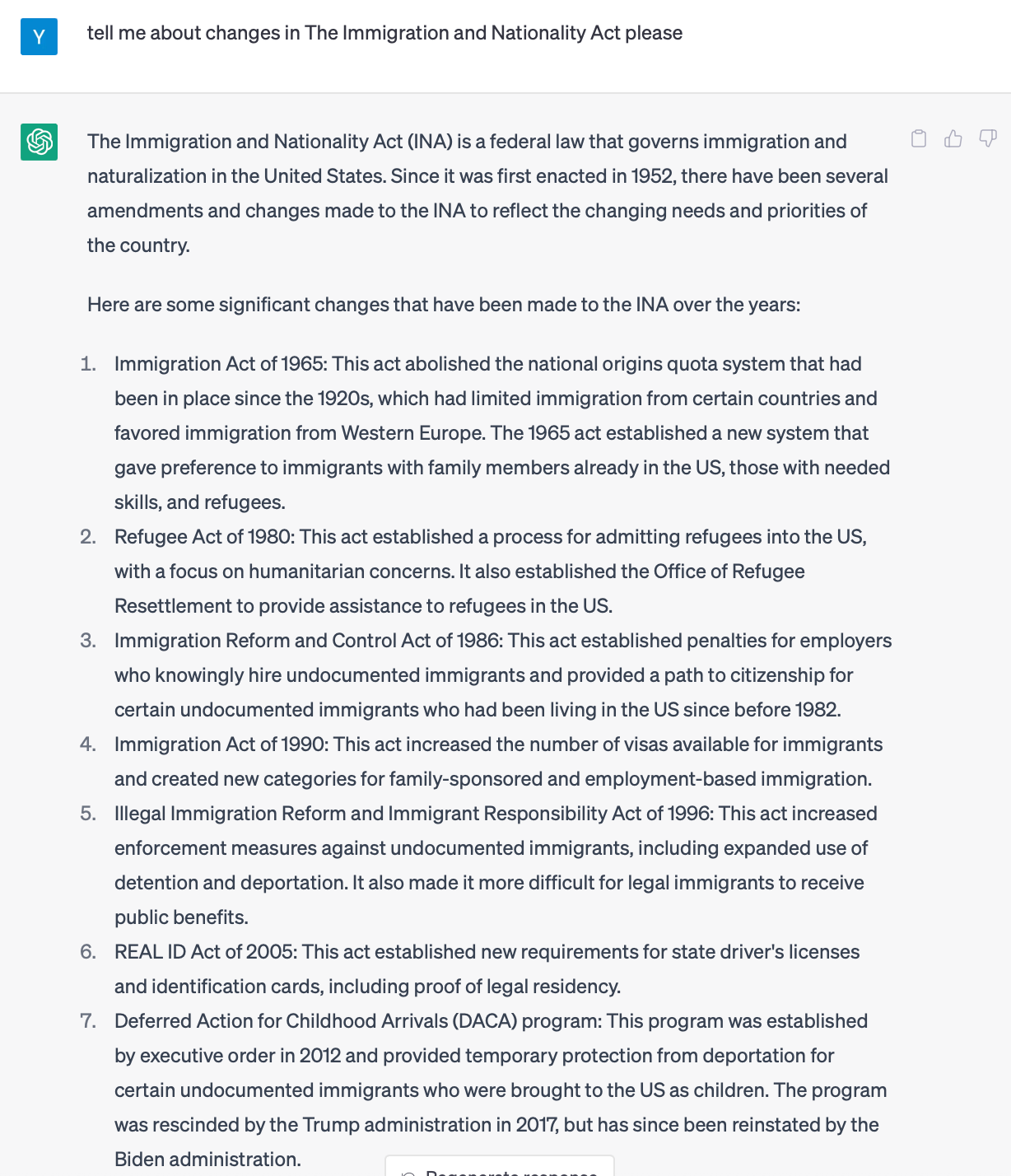
#2. Analyzing references and citations
Chat GPT can analyze all cases that cite specific statutes, regulations, or court rules.
For example, we asked the ChatGPT to name the most famous court cases that cite New Kids on the Block v. News America Pub., Inc.
Although this case is not famous or popular, other courts have used it as a precedent. It would take any lawyer quite a while to find this information. Chat GPT managed it quickly enough and called:
- White v. Samsung Electronics America, Inc. (1992)
- Estate of Presley v. Russen (1995).
- Comedy III Prods., Inc. v. Saderup, Inc. (2001)
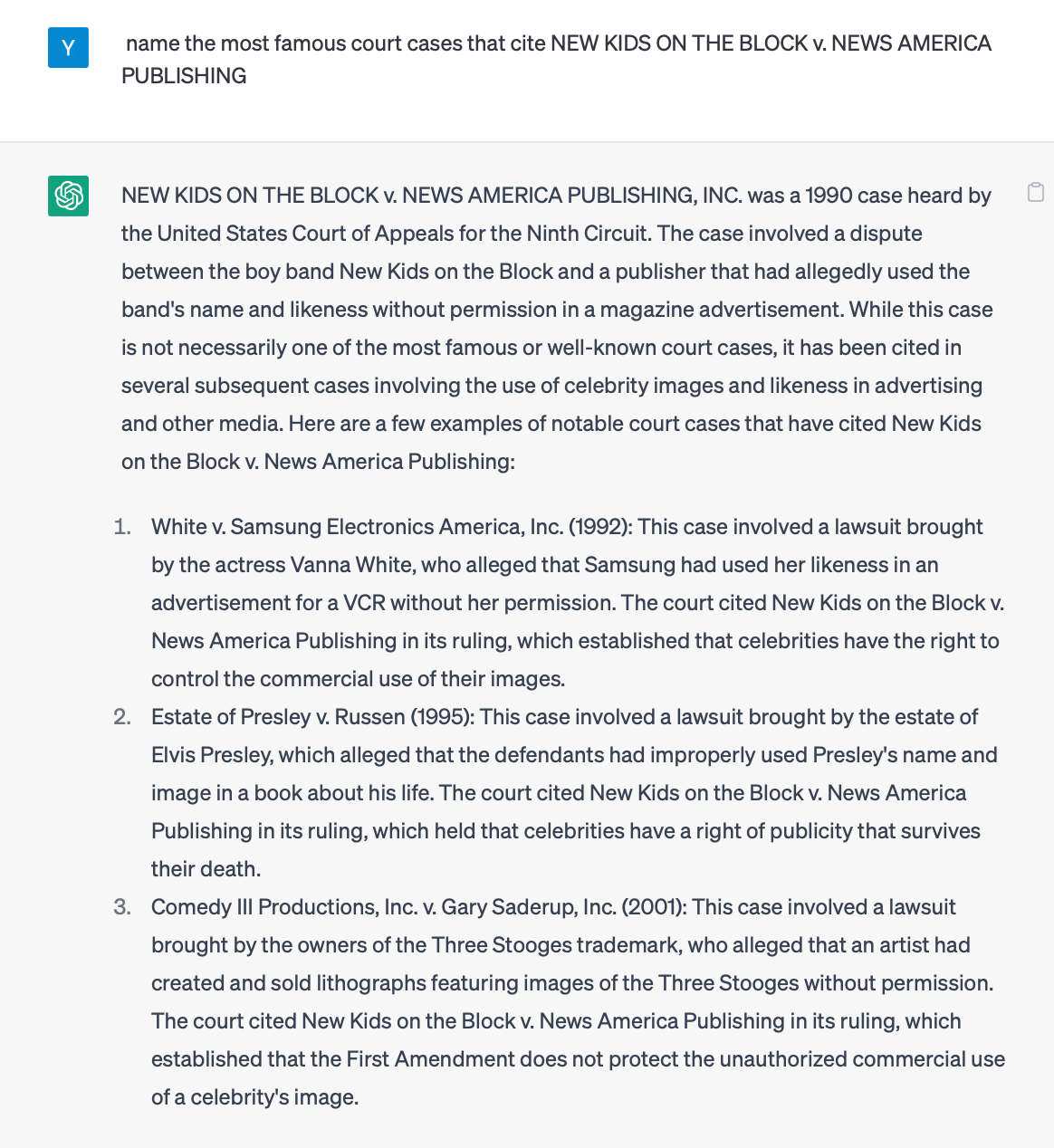
#3. Searching and analyzing case law
With the birth of the Internet, a lawyer's work has become much more manageable. There is no need to study thousands of pages and collections of case law in preparation for litigation. The Internet makes it possible to find the data you need in hours. Chat GPT has done that in just a few tens of seconds. So, we asked it: what case law should I use in the cases about trademark disputes? We got the needed answer with a few examples immediately:
- Polaroid Corp. v. Polarad Electronics Corp. (1961)
- Moseley v. V Secret Catalogue, Inc. (2003)
- Abercrombie & Fitch Co. v. Hunting World, Inc. (1976)
- Brookfield Communications, Inc. v. West Coast Entertainment Corp. (1999)
Also, the bot warned us that these are only some examples and the list is not exhaustive.
In addition, the legal theories according to these cases were named: Likelihood of Confusion, Dilution, Genericide, and Initial Interest Confusion, and a good analysis of these theories was given.
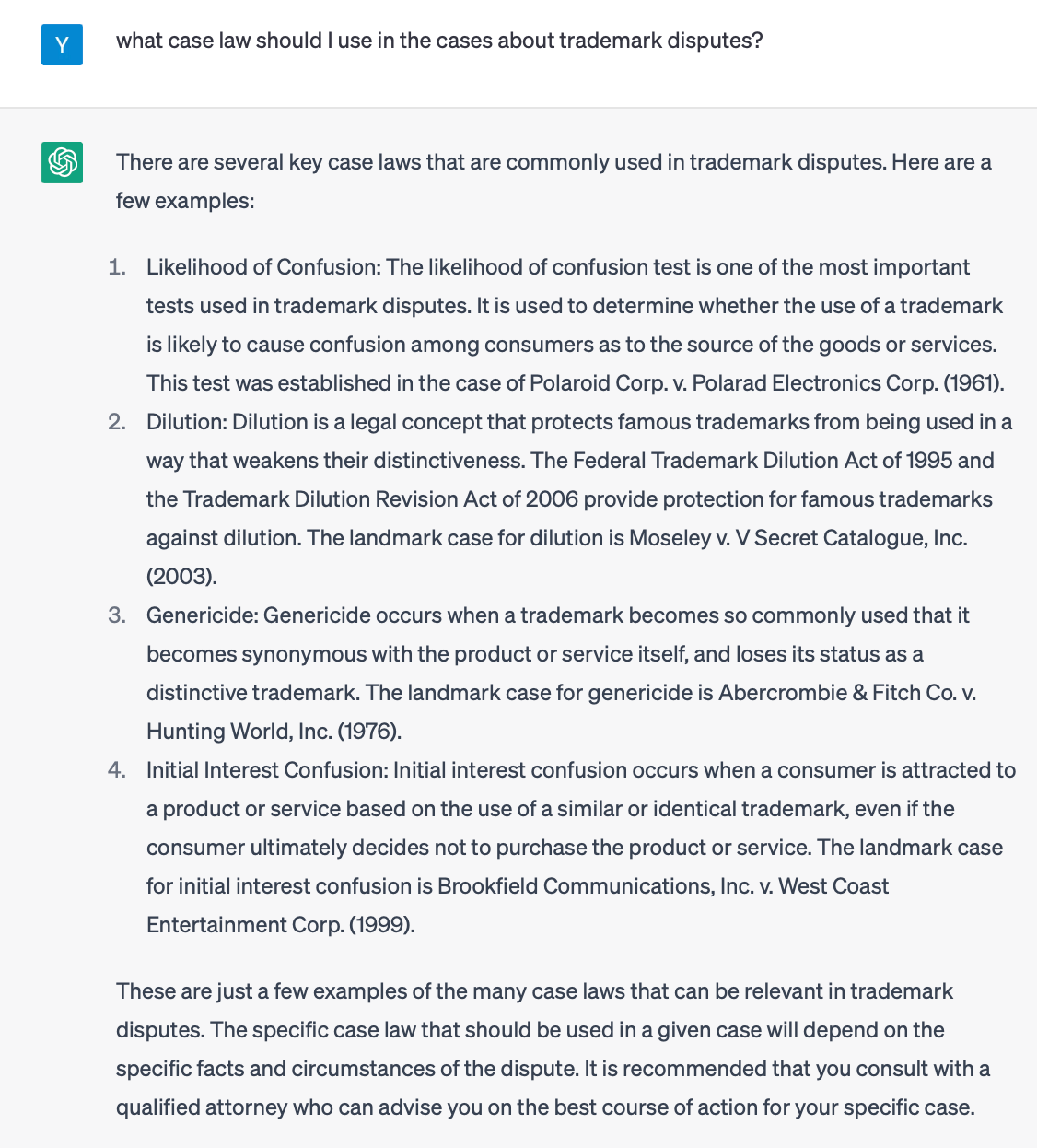
#4. Screening for research in legal scholarship and new legal theories
Improving knowledge in the legal field is relevant to any self-respecting lawyer. At the same time, it becomes more challenging. Therefore, you can use Chat GPT to save time on self-development issues. For example, we asked ChatGPT about some new legal theories. As you know, the knowledge of this AI language model is limited to September 2021. Nevertheless, it was interesting to learn, for example, about Algorithmic Justice, a field of research about the possibility of applying algorithms to criminal justice (risk assessment tools).
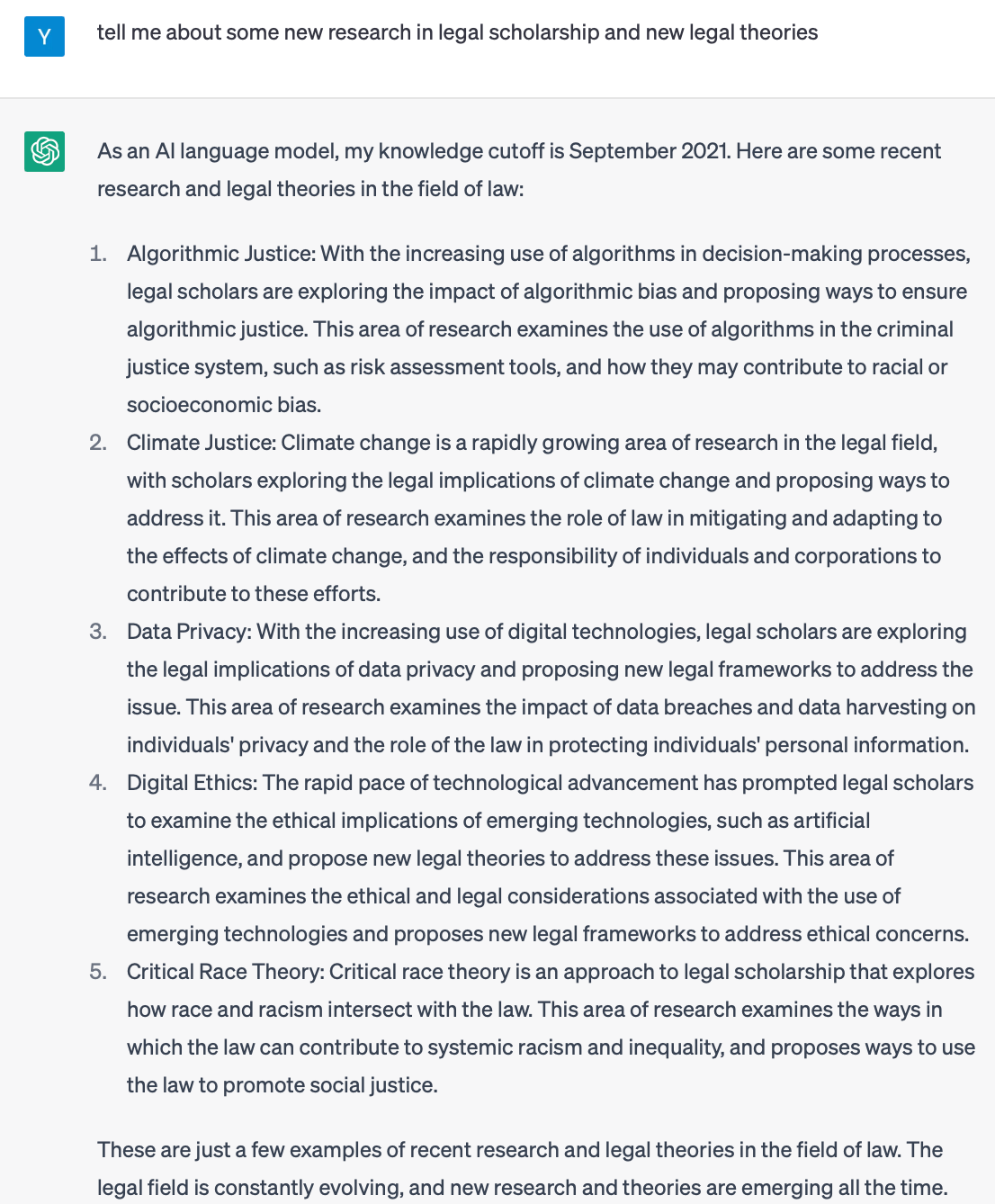
#5. Drafting legal advice
Some legal advice can be pretty simple and does not require much research, but it takes a lot of time to create it. ChatGPT can streamline this process, all you have to do is enter all the necessary input data, and an answer will be generated faster than you can drink a cup of coffee. Such questions may include, for example, divorce, alimony, and some questions on damages.
#6. Drafting lawsuits and other procedural documents
Some procedural documents are simple and can even be drafted by artificial intelligence. However, document verification is required.
For example, we asked the ChatGPT to write an employment discrimination lawsuit in which a healthy 35-year-old woman was denied a job because she was pregnant. We provided no other information. In this case, ChatGPT used fictitious data when drafting the lawsuit. Again, this demonstrates the need to provide complete details and the context of the legal relationship to get a better result.
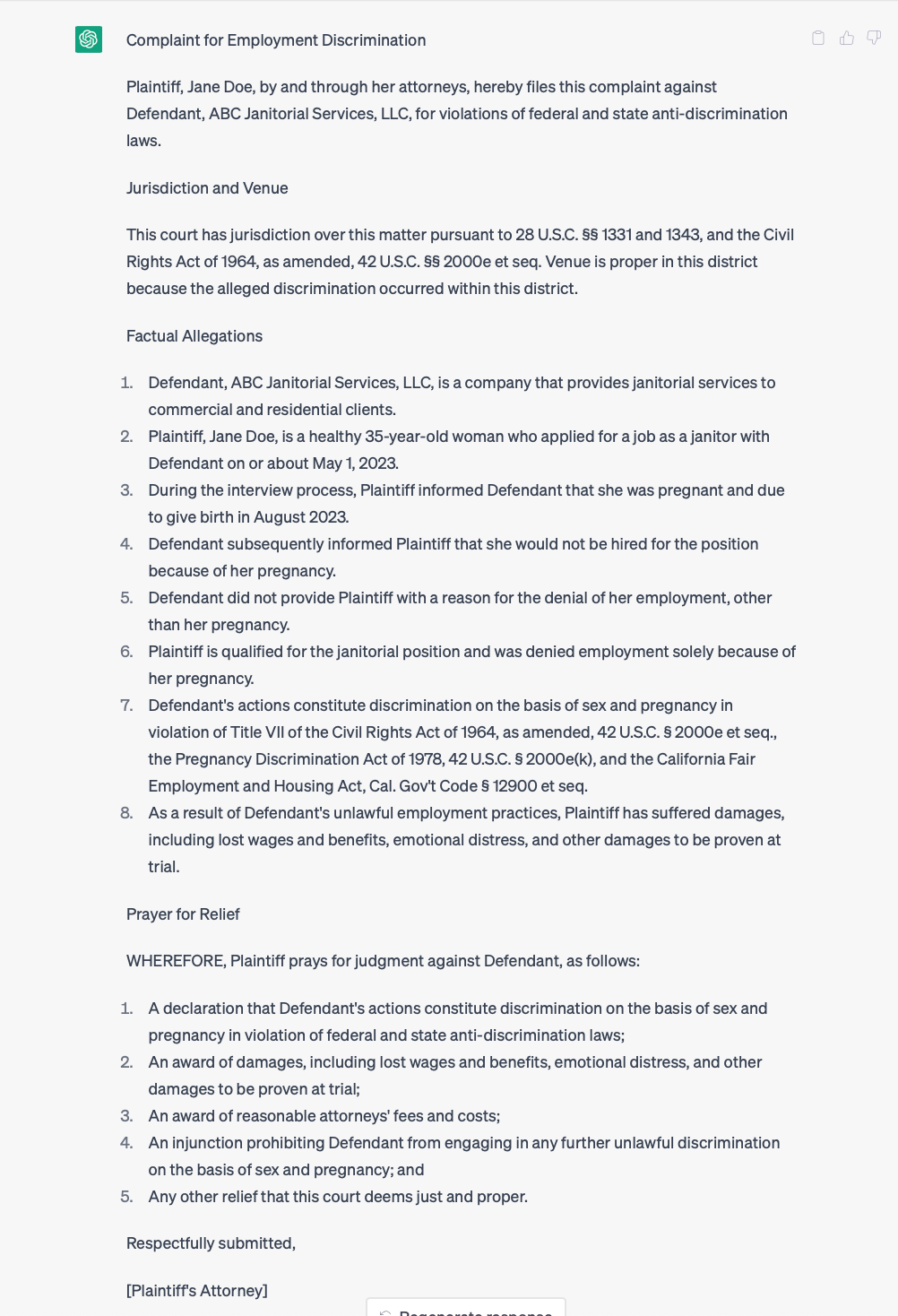
#7. Drafting contracts
Usually, a lawyer uses a contract he has already written for another client or drafts it for the first time. Why not use a project that ChatGPT can offer you? For example, we asked to write a non-compete agreement in the IT sphere. It completed the task without any significant flaws. In addition, the draft contract will be of higher quality if you tell the ChatGPT about the mandatory provisions and explain exactly its subject. You should make it a rule to check the proposed text in detail.


#8. Analyzing contract clauses
Lawyers often need to review and analyze specific clauses in contracts. ChatGPT can assist in breaking down complex clauses and identifying potential issues.
Initial prompt: Initial prompt: "Analyze this indemnification clause from a software licensing agreement: [paste clause here]. Identify potential risks for the licensee."
ChatGPT would provide a breakdown of the clause, highlighting key terms and potential risks for the licensee. This analysis can serve as a starting point for the lawyer's review.
Follow-up prompt: "Suggest modifications to this clause to better protect the licensee's interests."
Always verify ChatGPT's analysis against current legal standards and your professional judgment. The AI's interpretation should supplement your expertise, not replace it.
#9. Preparing for client interviews
Compelling client interviews is crucial for gathering the necessary information. ChatGPT can help lawyers prepare a comprehensive list of questions.
Initial prompt: "Generate a list of questions for an initial client interview in a trademark infringement case where a small business owner believes a larger company is using a similar logo."
ChatGPT would produce a list of relevant questions covering various aspects of the case, such as the history of the client's trademark, details of the alleged infringement, evidence of market confusion, and the client's business operations.
Follow-up prompt: "Add questions to assess the potential financial impact of the infringement on the client's business."
Remember, while ChatGPT can provide a solid foundation for your interview, tailor the questions to your specific client and case details.
#10. Summarizing deposition transcripts
Reviewing lengthy deposition transcripts can be time-consuming. ChatGPT can help by providing initial summaries.
Initial prompt: "Summarize the key points from this deposition transcript in a personal injury case: [paste transcript excerpt]."
ChatGPT would generate a concise summary highlighting main points, key admissions, and potential contradictions in the testimony.
Follow-up prompt: "Identify any statements that could be particularly damaging to the defendant's case."
Always review the full transcript yourself. ChatGPT's summary should be used as a tool to guide your review, not as a substitute for reading the entire
Using ChatGPT in law practice
To effectively use ChatGPT for legal work, consider these steps:
- Access ChatGPT: Sign up on the OpenAI website or use a legal-specific platform that incorporates ChatGPT technology.
- Craft effective prompts:
- Be specific in your requests.
- Provide context for complex legal issues.
- Ask for citations or references when needed.
- Review and verify: Always double-check the AI-generated content for accuracy and relevance. Remember, ChatGPT's knowledge cutoff date may not include recent legal changes.
- Maintain confidentiality: Avoid inputting sensitive client information or case details. Use hypothetical scenarios when possible.
- Combine with human expertise: Use ChatGPT as a starting point, then apply your legal knowledge to refine and customize the output.
- Stay updated: Follow developments in AI and law to understand how ChatGPT and similar tools are evolving.
- Consider ethical implications: Ensure your use of AI aligns with legal ethics and professional responsibility standards.
By following these guidelines, you can leverage ChatGPT to enhance your legal writing, research, and analysis while maintaining the high standards required in legal practice. As you become more familiar with ChatGPT, you'll discover new ways to integrate it into your workflow, potentially increasing your efficiency and productivity.
However, always be mindful of its limitations and potential biases. Regularly assess its impact on your work and decision-making processes.
Can Chat GPT replace lawyers?
ChatGPT is a powerful tool that lawyers should learn to use in their work to save time and optimize workflow.
The speed at which ChatGPT can draft legal documents is unachievable for humans.
Interestingly, law firms have already begun incorporating the new experience of using artificial intelligence in their work with clients. Allen & Overy can be mentioned.
The introduction of new forms of legal technology is helping to find ways to improve the effectiveness of legal professionals, as noted in the 2020 Legal Trends Report.
As technology advances, so do client expectations. However, it's worth remembering that lawyers are personally responsible for their practices, so don't rely entirely on imperfect, evolving technology, which ChatGPT is, among others.
Even though ChatGPT can almost completely replicate human communication, it can still replace a lawyer in his work with legal documents, public authorities, and people only partially. We can explain it by flaws directly related to ChatGPT, which can be crucial in the practice of law.
Read More: 7 Ways You Can Use ChatGPT in Accounting
Limitations of using ChatGPT for Legal Operations
Despite all the advantages of ChatGPT when appropriately used in legal practice, including drafting procedural documents and analyzing case law, its use also has some limitations.
The issue of legal expertise: ChatGPT is not a tool specifically designed for a lawyer. Therefore, you will be unable to get an accurate answer to your legal question as if a professional lawyer had generated the response.
Lack of accuracy: ChatGPT's responses are based on its training data, which may not include the most recent legal developments. Always verify the accuracy of any information or legal analysis provided by the AI. It's crucial to use ChatGPT as a starting point, not as a definitive source.
Ethical issue: Confidentiality and security of data provided to a lawyer during a consultation or assignment is a significant issue in lawyer-client interaction. From an ethical perspective, the potential for ChatGPT to disclose sensitive data received increases concerns about the use of artificial intelligence in the practice of law. In addition, applying data privacy and security laws to text created by artificial intelligence remains an open question.
Lack of detail and understanding of context: ChatGPT needs help understanding the context in which the language is used and the task at hand when processing text. As a result, responses to legal queries are often incomplete and inaccurate, which can have unpredictable consequences if not adequately supervised by a legal professional. Lawyers remain responsible for the work product they deliver to clients, even if AI tools are used in the process. Maintain oversight and use your professional judgment when incorporating AI-generated content.
The issue of prejudice: ChatGPT uses a wide variety of data for its training. Such data may have elements of subjectivity, injustice, inequality, discrimination, and myths. It can lead to biased responses, which can have ethical implications.
The issue of control: the process of making ChatGPT decisions is difficult to understand. The main feature of this process is a lack of transparency. Because of this, uncontrolled use of ChatGPT is impossible.
Because of the restrictions mentioned above on using ChatGPT by lawyers, we must recognize the need to use it only if there is human control based on human experience and legal expertise. Otherwise, no one can guarantee responses' accuracy, objectivity, and fairness.
The broader landscape: AI applications in legal practice
While we've focused on ChatGPT, AI-based tools are transforming the legal industry in many ways.
.png)
Here's a look at different applications:
Document review and analysis: AI rapidly scans thousands of legal documents, identifying critical information and risks.
Legal research: Advanced tools search vast databases, finding relevant cases and predicting outcomes based on historical data.
Contract management: AI-powered systems assist in drafting, reviewing, and managing contracts throughout their lifecycle.
E-discovery: AI sifts through massive amounts of electronic data, speeding up the discovery process in litigation.
Intellectual property management: AI helps with patent searches, trademark monitoring, and identifying potential infringements.
Due diligence: In M&A, AI analyzes corporate documents, flagging potential issues and inconsistencies.
Compliance monitoring: AI systems track legal updates and identify potential compliance issues.
Predictive analytics: AI analyzes historical case data to predict outcomes and litigation risks.
These AI applications, including specialized tools like OCR for digitizing documents, are revolutionizing legal practice. They enhance efficiency, reduce costs, and improve accuracy in many aspects of legal work.
However, it's crucial to remember that these AI tools are designed to augment, not replace, human legal expertise. The most effective use of AI in law combines these powerful tools with the nuanced judgment, ethical considerations, and strategic thinking that only human legal professionals can provide.
Nanonets AI-based OCR for legal text extraction
Nanonets is an OCR software that leverages AI & ML capabilities to automatically extract unstructured/structured data from PDF documents, images, and scanned files. Unlike traditional OCR solutions, Nanonets do not require separate rules and templates for each new document type.
.png)
Using AI-driven cognitive intelligence, Nanonets can handle semi-structured and unseen document types while improving over time. While offering a great API & documentation for developers, the software is also ideal for legal teams with no prior knowledge or expertise with technology.

The benefits of using Nanonets over other automated OCR software go far beyond cost savings, accuracy, and scale. Nanonets additionally provide unique benefits that place them far ahead of the competition:
- A truly no-code tool
- No post-processing is needed
- Works with custom data
- Easily handles data constraints
- Works with multiple languages
- Continuous learning
- Infinite customization
See how you can automate repetitive manual legal tasks with Nanonets. Save 90% of your time, effort & money while enhancing efficiency!
.png)
Start your free trial or schedule a call with us.
Conclusion
ChatGPT is a tool and should be treated as such.
As you can see, the possibilities of using ChatGPT by legal professionals are vast, almost limitless. But artificial intelligence can make mistakes due to bias, a lack of understanding of the legal context, or an incomplete data set to produce the correct answer.
That is why excluding the legal professional entirely from the process is impossible.
FAQs
How do lawyers use ChatGPT?
- Legal research: Quickly finding relevant cases and statutes
- Document drafting: Creating initial drafts of contracts, briefs, and memos
- Case analysis: Generating potential arguments and identifying key issues
- Client communication: Drafting responses and explaining complex legal concepts
- Due diligence: Summarizing large volumes of documents
Can you ask ChatGPT legal questions?
Yes, you can ask ChatGPT legal questions, but with important caveats:
- ChatGPT provides general information, not personalized legal advice
- Its knowledge may not be up-to-date with the latest laws and regulations
- Always verify information with authoritative legal sources
- Use it as a starting point for research, not as a definitive answer
Can ChatGPT write legal documents?
ChatGPT can assist in writing legal documents, but should not be used to create final versions:
- It can generate initial drafts of contracts, memos, and briefs
- The AI can help structure documents and suggest relevant clauses
- Human review and editing are crucial for accuracy and context
- It's a tool to enhance efficiency, not replace lawyer expertise
How to prompt ChatGPT to review a contract?
To use ChatGPT for contract review:
- Provide clear context about the contract type and parties involved
- Ask specific questions about clauses or terms you want to analyze
- Request identification of potential risks or unusual provisions
- Use follow-up prompts to dig deeper into specific areas of concern
- Always combine AI review with human legal expertise for thorough analysis
Remember, while ChatGPT can be a valuable tool, it should be used to supplement, not replace, a lawyer's knowledge.


